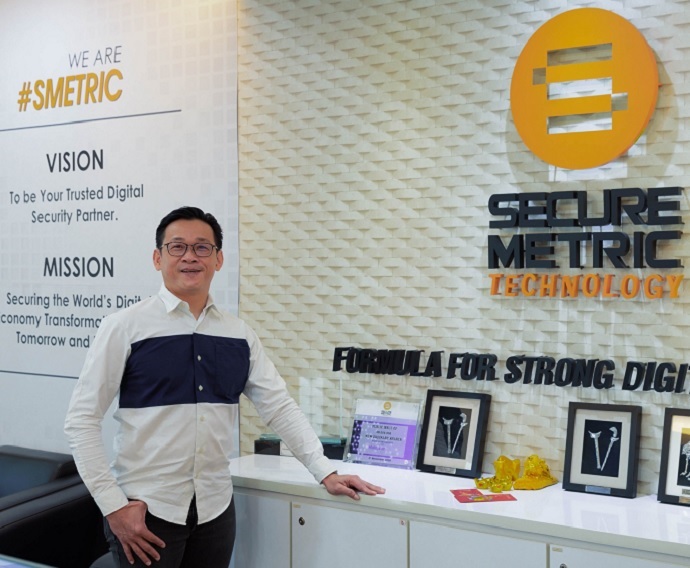Edward Law of Securemetric saw Digital ID’s coming – 17 years ago
By Anandhi Gopinath February 19, 2024
- Digital IDs not just a necessity but a tool for empowerment and connection
- Presence in 5 countries, technology being used in Singapore’s SingPass

When you listen to the way Edward Law talks about the tech company he founded in 2007, you realise that he’s actually describing a digital pioneer.
Securemetric is a Malaysian based Southeast Asian company at the forefront of issuing the digital identities that are transforming the way we navigate the online world – and has been a topic of hot conversation in Malaysia lately with the national Digital ID rollout.
In a landscape where the internet has become an integral part of our daily lives, Securemetric is a trailblazer, at least in Southeast Asia, providing individuals with the keys to their digital personas and unlocking a world of possibilities. And this, long before Malaysia launched its Digital ID for citizens last month with Prime Minister Anwar Ibrahim said to be the first citizen to create his digital ID from the program. But no prizes for guessing that Edward has long had a digital ID.
And while we are on the subject of Digital ID, on that claim of being the first Malaysian to have a Digital ID created from the national rollout, it behooves me to gently point out that Anwar is not the first Malaysian to have a national digital ID. He actually isn’t even in the top 2,000. That is because when Mimos Bhd was developing the platform for Malaysia’s national Digital ID in 2018, it issued 2,000 digital IDs to civil servants in a pilot to test the platform and some early services.
Those certs expired after one year though, so the Prime Minister’s Office can claim that Anwar is the first citizen to have the first national digital ID with the system going live.
Back to Edward now.
With a commitment to security, accessibility, and innovation, Edward can claim that Securemetric Bhd, which he listed in 2018 and today has a market capitalisation of roughly US$16.9 million (RM80.8 million), has ushered in a new era where digital identities are not just a necessity but a tool for empowerment and connection.
Consider this. The UNDP estimated in 2020 that nearly 1 billion people have no official proof of identity. And without that, they cannot access public or private services, excluded from society, and the digital economy. Meanwhile of the 6.6 billion people who have some form of identification, over 50% cannot use it effectively in today’s digital ecosystems said the UNDP.
And in a 2019 report that management consultants McKinsey did, focusing on seven countries, it found that extending full digital ID coverage with multiple high-value use cases could unlock economic value equivalent to 3% to 13% of GDP in 2030.
Yes, the upside is huge once a country rolls out its digital identity program well.
Yet when Edward started out in his career, digital identities wasn’t on the cards quite yet. While working on proprietary digital security solutions, a realisation dawned on him that the foreign-produced applications that were available around 2007 were not working well enough for local clients.
“I was in the digital securities business, but as a distributor and not a developer with my own products,” he says. “I realised that an over-reliance on overseas security products was both unhealthy and unsustainable. Because you then don’t carry the flexibility to localise the solutions, which was something I saw as necessary. Countries in Asia have different regulations and different approaches to the idea of digital security, so it became very difficult to have one solution to fit everything,” he explains.
Thus, Securemetric was launched in 2007, self-funded by Edward to build his own innovative solutions for a market, that he says, “we knew better than all these overseas providers.” It took over a year for his team of 20+ to build their own product but Edward is proud to say that the company has been profitable since Year One as he was selling third party products to the market initially.
Early day challenges
Just because he had a solution for a problem didn’t mean the company was without its challenges in its early days. “What we faced is I believe common for many startups in Malaysia. Recruiting engineers was hard because we were competing against companies in Singapore and multinationals in Malaysia,” he said. And that was the easier challenge.
“It was hard for us to convince local finance companies and government agencies to trust us because we were small and less established. They would rather go to foreign brands because of their history, even though those products weren’t always customisable for local needs.”
That forced Edward to take the route trekked by other Malaysian tech founders before him. He sought out markets outside Malaysia with Singapore the first market he expanded to (though he served the market from KL) and winning customers in 2008. It subsequently became much easier to penetrate the Malaysian market, thanks to the regional business he won.
“We were able to come across as an international Malaysian company with regional experience. This was great for our portfolio!” Indonesia was the first country he opened a subsidiary in 2008 with the country contributing the largest portion of overseas sales over the last six years.
Although established in an era before technology changed as rapidly as it does now, Edward has kept up with the times and today leads Securemetric to focus on three main pillars. Securing mobiles is one, where they provide security solutions for apps such as e-wallets, banking, trading and so on. Secure online transactions are a second major pillar, which ensures the correctly authenticated person signs and received contracts. It guarantees non-repudiation in e-signatures through a platform that seamlessly accommodates both digital and electronic signatures, ensuring the utmost authenticity and security.
[Ed note: The technology used to create the two signatures are different. More secure than electronic signatures due to the technology used, digital signatures require specialized software and adopt encryption technology, while electronic signatures can be created using basic tools such as a mouse, touchpad, or stylus. In terms of usage, electronic signatures indicate that a signer is knowingly entering an agreement, while digital signatures provide assurance and verify that a signed document hasn’t been altered or forged.]
And, thanks to the timing of it, the third pillar – securing digital identities – is now the hot topic among Malaysians. “With our MyKad, no one can verify its authenticity because you cannot validate thumbprints online,” Edward says, using Malaysia’s national identity card as a reference. “You need something similar where the issuer will completely verify you before they issue this digital identity,” he said, adding that Securemetrics is very strong in this space.
“We are one of Southeast Asia’s leading public key infrastructure providers. We help many governments and enterprises to implement back-end systems that will help them issue these digital IDs. So far, in the past we have helped seven out of 10 governments in Southeast Asia, including Singapore, as well as many large companies.”
But the potential is global. According to market research and consulting firm, MarketsandMarkets, the global Digital ID market is projected to grow at a cumulative average growth rate of 20.4% and reach US$70.7 billion (RM337 billion) over the next five years. There are also predictions that over 50% of the global population will have some form of digital identity.
Excited over Malaysia’s MyDigital ID
During the tabling of the 2024 budget in Oct 2023, the government said it would expedite the development of digital IDs, in part to accelerate digital transformation in the public sector. MyDigital ID will be available to the general public by July 2024, according to the national research and development centre Mimos. It will be rolled out in four phases, starting with members of the Malaysian Cabinet and followed by civil servants, recipients of the various government benefit programs and finally the general public.
“We are very excited to see this happening. It is so critical in creating trust in a digital economy,” Edward says. “With MyDigital ID in place, we can overcome the trust issue in the local digital economy.”
On how Securemetric can potentially be a part of this, Edward said it will depend. “Eventually, if the government decides to set up a national certification authority, an area we are very strong in, I believe our experience can be very helpful.”
Within its portfolio, Edward believes Securemetric has products that can be effective tools that will help promote the adoption of the MyDigital ID across both government and private sectors.
Several countries have made significant progress in the adoption of digital identities. Estonia is recognised for its pioneering e-Residency program, while Singapore’s SingPass system was launch in Oct 2018 and today has a 97% user base of those above age 15, covering citizens and those with PR status.
The United Kingdom’s Verify program and Sweden’s BankID also contribute to digital identity advancements. India's Aadhaar program stands out for issuing biometric-based unique identification numbers to over a billion citizens. These countries, among others, are actively implementing digital identity systems to enhance security, privacy, and convenience in accessing online services.
As to what’s next, “We are continually growing our business and innovating – that is truly what we stand for,” says Edward who sees it as his responsibility for keeping Securemetric ahead of technology trends. The key is to have close engagements with clients and, “listening to them as they encounter new challenges. This is how we determine if our defence mechanisms (solutions) are sufficient.”
He also encourages his technical team to continuously up their skills with training and going for independent certification.
Related Stories :


